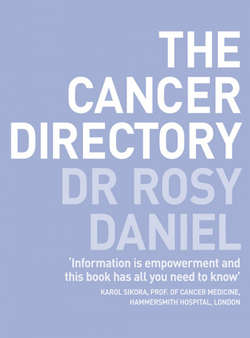Читать книгу The Cancer Directory - Dr. Daniel Rosy - Страница 46
Getting immediate help
ОглавлениеFind out what support resources are available at the hospital where you have been diagnosed, or at your regional cancer centre, which may be larger and better equipped. Next, find out what help there is from your GP, community nurses or local hospice, then find out if there are any local or national support groups or local private counsellors who can help you. Do not be afraid to ask for the help you need, and use it for as long as you need it. Getting good support for your emotional state will greatly help you both in the decision-making process to follow and in getting you the best outcome from your treatment.
It may be that your GP, community nurses or health visitor could be called to the house to give you immediate support, or that a local support group could provide someone to keep a close eye on you for the first week after diagnosis. Certainly, if you avail yourself of the services of a Health Creation Mentor, they will be particularly vigilant in this initial time, helping you to access the best possible support available in your area (tel: 0845 009 3366).
It is very likely that you will need crisis counselling at this time to help you get through your initial reaction. This kind of counselling is beneficial and rather different from the kind of counselling you will need later on to help you get well again. This may also be the time you may wish to reach for the help of spiritual guidance from where you usually worship, or for a spiritual healer. There may be many questions you wish to ask, but the main role of these spiritual helpers will be to try to help bring you into your still, calm centre, where you may find peace and inner strength during the difficult times.
Finding Support
• Your local cancer unit or regional cancer centre
• Specialist nurses such as Macmillan, Marie Curie or practice nurses
• Your local hospice (which are not only for the seriously ill)
• Your GP
• Support groups (see the Resources Directory, pages 384–404)
• Counsellors (private or through your GP surgery)
• Spiritual advisors or healers (see the Resources Directory, pages 372, 404–6).
Also, find out what support is available from:
• Your family
• Your partner
• Your friends
• Your colleagues or occupational health department
• Your local church or relevant religious community.
Use the Resources Directory to see what specific help may be available from support groups or charities dealing with your kind of cancer or resulting disabilities, and any problems you may have arising from the treatment. Help may also be available to deal with the financial, legal or social problems due to your diagnosis.
Find out what help is available nationally from:
• Illness-specific support groups
• Disability-specific support groups
• National charities
• Legal services
• Social Services
• Citizens’ Advice Bureaux.
